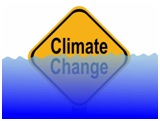|
 |
|
 |
|
|
||
Climate change
Climate change is... Changes in climate largely resulting from the warming of the world’s air and oceans (so it is also called global warming). This is caused by carbon dioxide (CO2) emissions primarily from the burning of fossil fuels (oil, coal and gas). Other contributors are deforestation, chemical fertilizers and methane producers like cattle.
Solutions are:
1. International agreements to limit CO2 emissions (e.g. the 2010 Cancun Agreement).
2. Sustainable development (eco-friendly economic development).
3. Carbon free energy a) renewable energy (e.g. wind, wave, solar and hydro-electric). b) biofuel (gasoline from grain). c) nuclear energy. d) hydrogen (powering cars that emit water not fumes).
4. Conservation and fuel/energy efficiency (so reducing consumption).
5. Carbon capture and storage (CCS) (particularly in coal fired power stations and through the production of biochar charcoal).
6. Cap and trade Trading in CO2 emission allowances between countries and businesses.
7. Deforestation control Paying countries like Brazil not to cut down forests like the Amazon rainforest (often referred to as the ‘lungs of the world’).
8. Geo-engineering Technological solutions like giant mirrors in space to block out the sun!
9. Birth control A rapidly rising population is putting an enormous strain on the world’s resources.
The Stern Report is... A 2006 British government report by Professor Nicholas Stern (pictured right) who said that climate change can be solved (with the measures listed above) without reducing economic growth (increases in a country’s income and production). In 2008 Stern said the report underestimated the effects of climate change and called for urgent action.
An Inconvenient Truth is... A 2006 film starring ex- American vice president Al Gore (pictured right) as part of his global campaign to publicize the dangers of climate change.
Why businesses must do something about climate change
1. Its catastrophic effects
2. Customer satisfaction Many customers want environmentally friendly (or green) products and support businesses that actively do something about climate change.
3. Employee recruitment and motivation Companies attract recruits and motivate employees by being green.
4. Government pressure The problem of climate change is so serious that governments will have to force businesses to do something, if they don’t act voluntarily.
5. Pressure groups Environmental groups like Greenpeace are constantly pressurizing companies to do something about climate change. Co-operating with them would help to find solutions to it and win their support.
Key quotes explained “There can be no progress if people have no faith in tomorrow”, - John F. Kennedy, American president (pictured right). It is easy to be pessimistic and feel powerless about climate change. But it is essential that we all resolve to find solutions to it and pressurize governments to implement them.
“We have not inherited the earth from our parents, we have borrowed it from our children”, - Native American proverb. Anything we do must consider how it will affect fu “They paved paradise and put up a parking lot”, Joni Mitchell (pictured right) lamented in her hit song Yellow Taxi.
“To see a world in a grain of sand, and a heaven in a wild flower”, - William Blake (English poet, pictured right, from his poem, Auguries of Innocence). It would be a disaster if greed destroyed the planet and its beauty. “What is the use of a house if you haven’t a tolerable planet to put it on?”, asked the American philosopher, Henry David Thoreau – see below.
Best books
Henry David Thoreau (pictured right), Walden (1854) Materialism is increasing stress and destroying the environment, so we must live more simply, reduce our spending and love and respect nature.
Rachel Carson (pictured right), Silent Spring (1962) This launched the American environmental movement with its attack on the uncontrolled use of pesticides (killing birds, so creating a “silent spring”).
Jacques Cousteau(pictured right) and Frédéric Dumas, The Silent World (1953) With his famous ship, the Calypso, the Frenchman, Jacques Cousteau (1910-97), was a pioneer of scuba diving and opened the world’s eyes to the “silent world” under water through his books, films and TV programmes. He was a passionate conservationist and attacked the world for turning the sea into a “universal sewer”.
James Lovelock (pictured right), Gaia (1979) This launched the influential gaia movement that believes that the Earth is a living interdependent organism. For example, the over-development of land will harm the air and sea. In later books (including The Revenge of Gaia, 2006), Lovelock predicts global destruction, if we do nothing about climate change.
Bjorn Lomborg (pictured right), The Sceptical Environmentalist (1998) The Danish environmentalist controversially says that climate change isn’t a big problem, and money spent reducing CO2 emissions would be better spent helping the world’s poor and developing non-carbon energy. But even Lomborg is now worried about the frightening increase in global temperatures.
Tim Flannery (pictured right), The Weather Makers (2005) Flannery (an influential Australian naturalist and explorer) supports nuclear power and the need to gain business support for the environment.
Richard Branson (pictured right), Screw Business As Usual (2013) “Doing good is good for business”, says Virgin’s boss, because social responsibility (particularly concern for people and the planet) attracts and motivates great employees.
Jonathan Lash and Fred Wellington (pictured right), Competitive Advantage On A Warming Planet (Harvard Business Review article, 2007) Assess how climate change will affect your organization, effectively responding to its risks and exploiting its market opportunities better than your competitors.
Naomi Klein (pictured right) This Changes Everything (2014) The only way to beat climate change is a revolution to overthrow capitalism and market economics. |
|
|
||
|
|
||
| Copyright © wisdomtowin.com 2025 All Rights Reserved | ||
|








 ture generations including our children. We must not destroy nature in pursuit of money.
ture generations including our children. We must not destroy nature in pursuit of money.









